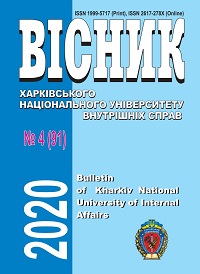Legal Regulation of Police Work Incentives
Abstract
Based on the analysis of scientific views of scholars, the author has established that the legal regulation of incentives for police work is the regulation of public relations by law means in regard to external incentives for police officers to highly professional, conscientious and dedicated performance of professional and official tasks, functions and powers, as well as their encouragement to achieve positive results in this work.
It has been emphasized that the need for legal regulation of incentives for police work is due to the fact that, first of all, employees must know and understand what they can expect in case of successful, dedicated, high-quality and effective performance of their duties and responsibilities, as well as what they can expect in case of improper (not effective, in terms of the violation of law, official discipline, norms of public morality, professional ethics, etc.) perfomance of their powers; secondly, work incentives are provided not only through positive motivation and encouragement, i.e. in the form of receiving appropriate remuneration by a police officer or public recognition of his or her merits, but also through the possibility of prosecuting a police officer for improper performance of official duties.
The author has proved that it would be appropriate to provide the right of other subjects, such as members of the public, to raise the issue of encouraging a police officer in order to reduce the dependence of police officers on their immediate superiors in terms of incentives for conscientious work and special merits to society, since police officers serve not the superior officer, but to the people of Ukraine.
It has been clarified that the normative principles of implementing the incentive measures within the system of police agencies cause certain remarks that do not allow to consider incentives as an unequivocally effective tool for influencing the efficiency and quality of police officers’ performance of their professional tasks, functions and responsibilities; a tool that really encourages them to selfless and conscientious work in the interests and for the benefit of the people of our state.
Downloads
References
Klochko A.M., Sobyna V.O. and Khrystenko K.M., 2018. Problematic issues of staff motivation in the National Police [Problemni pytannia motyvatsii personalu v orhanakh Natsionalnoi politsii]. Vìsnik Nacìonalʹnogo unìversitetu civìlʹnogo zahistu Ukraïni. Serìâ Deržavne upravlìnnâ – Bulletin of National University of Civil Defence of Ukraine. State Management series, Iss. 2, pp. 266-273.
Matiienko T., 2019. Structure and factors of formation of professional motivation of police officers [Struktura ta faktory formuvannia profesiinoi motyvatsii politseiskykh]. Pìdpriêmnictvo, gospodarstvo ì pravo – Entrepreneurship, Economy and Law, No. 10, pp. 228-231.
Lukashevych M.P., 2004. Sociology of labor [Sotsiolohiia pratsi]. Kyiv: Lybid.
Kolot A.M., 1998. Motivation, stimulation and evaluation of staff [Motyvatsiia, stymuliuvannia i otsinka personalu]. Kyiv: KNEU.
Ovsiuk N.V., 2014. Motivation and stimulation of work: the essence of concepts and their reflection in accounting [Motyvatsiia ta stymuliuvannia pratsi: sutnist poniat ta vidobrazhennia yikh v obliku]. Ìnnovacìjna ekonomìka – Innovative Economy, No. 4, pp. 314-315.
Bandurka O.M., 1998. Management in Departments of Internal Affairs of Ukraine [Upravlinnia v orhanakh vnutrishnikh sprav Ukrainy]. Kharkiv: Universytet vnutrishnikh sprav.
Sobolev V.O., 2007. Personnel management in law enforcement agencies [Menedzhment personalu v orhanakh vnutrishnikh sprav]. Kharkiv: Espada.
Venediktov S.V., 2004. Professional motivation as a prerequisite for stimulating and increasing activity in the employment relations of police officers [Profesiina motyvatsiia yak peredumova stymuliuvannia ta pidvyshchennia aktyvnosti v sluzhbovo-trudovykh vidnosynakh pratsivnykiv OVS]. Pravo Bezpeka, No. 3, pp. 103-105.
Shovhelia O., 2012. Motivation of civil servants: theoretical aspects [Motyvatsiia derzhavnykh sluzhbovtsiv: teoretychni aspekty]. Deržavne upravlìnnâ ta mìsceve samovrâduvannâ – Public Administration and Local Government, Iss. 3, pp. 223-231.
Diakova O.O., 2017. Motivation as a subjective factor in counteracting legal nihilism in the police [Motyvatsiia yak subiektyvnyi chynnyk protydii pravovomu nihilizmu v diialnosti politsii]. Forum prava – Forum of Law, [online] No. 5, pp. 132-137. http://doi.org/10.5281/zenodo.1194584.
Mishchenko K.S., 2018. Motivation of civil servants in foreign countries: experience for Ukraine [Motyvatsiia pratsi derzavnykh sluzhbovtsiv u zarubizhnykh krainakh svitu: dosvid dlia Ukrainy]. Deržavno-upravlìnsʹkì studìï, [online] No. 6. Available at http://studio.ipk.edu.ua/motyvatsiya-pratsi-derzhavnykh-sluzhbovtsiv-u-zarubizhnykh-krayinakh-dosvid-dlya-ukrayiny/ [Accessed 13 November 2020].
Kovbasiuk Yu.V., Obolenskyi O.Yu., Serohin S.M. et al., 2012. Public service [Derzhavna sluzhba]: in 2 vols. Vol. 1. Kyiv; Odesa: NADU.
Copyright (c) 2020 K. V. Kovalenko

This work is licensed under a Creative Commons Attribution 4.0 International License.




